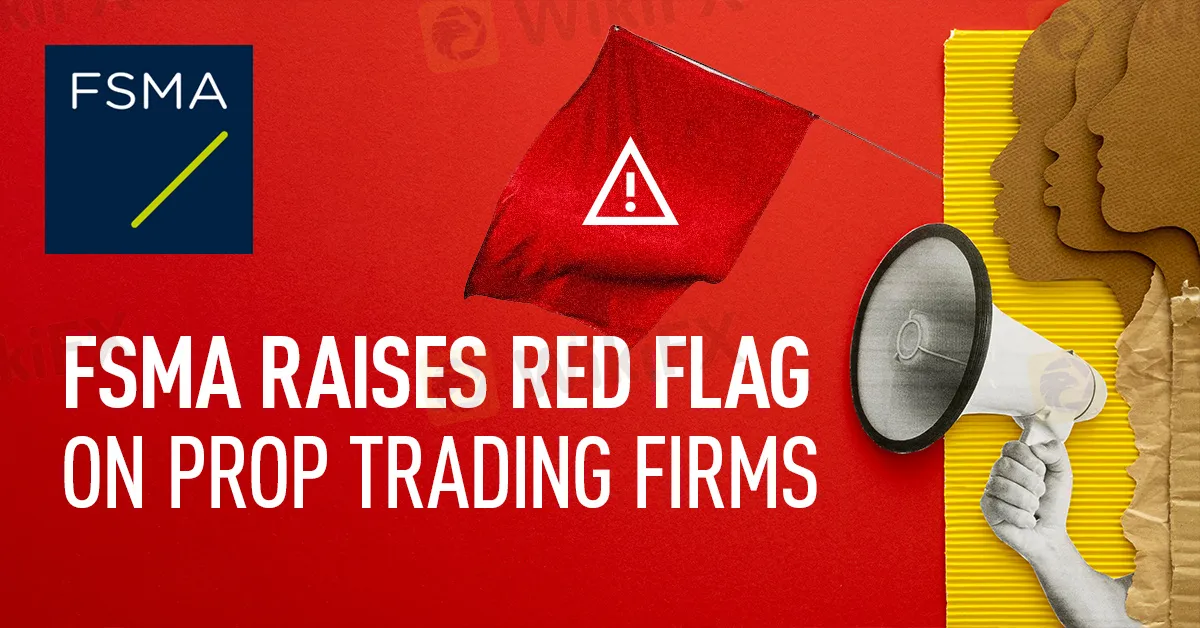简体中文
繁體中文
English
Pусский
日本語
ภาษาไทย
Tiếng Việt
Bahasa Indonesia
Español
हिन्दी
Filippiiniläinen
Français
Deutsch
Português
Türkçe
한국어
العربية
FSMA Raises Red Flag on Prop Trading Firms
Abstract:The Financial Services and Markets Authority (FSMA) issued a public warning against proprietary trading firms. There goes another hit for the proprietary trading firms!

The Financial Services and Markets Authority (FSMA) has issued a public advisory regarding the dangers associated with proprietary trading (prop trading) firms.
Prop trading firms, as elucidated by the FSMA, function by enabling consumers to trade various financial instruments such as shares, bonds, commodities, cryptocurrencies, Contracts for Difference (CFDs), and forex products without requiring the use of their own capital. However, the apparent risk-free nature of these opportunities often conceals an intricate network of financial pitfalls.
The regulator asserts that entities of this nature are currently under investigation for their questionable practices, which involve exploiting the financial inexperience of consumers and enticing them into high-risk investments.

The FSMA outlines that consumers interested in participating with prop trading firms are compelled to undergo costly and demanding courses. These courses, with a substantial price tag, aim to sift out less committed participants while generating revenue for the firms. Upon completion of these courses, consumers receive a 'certificate,' essentially a diploma issued by the firm, granting them participation in simulated trading activities. This simulated trading involves using demo accounts provided by prop trading firms, where consumers never execute real trades. Instead, the firm maintains full control over the simulated transactions, leaving consumers unaware of any potential commissions. It is also reported that many consumers find themselves caught in a cycle of paying for multiple courses without gaining access to actual trading opportunities.
The FSMA has observed a troubling surge in advertising for prop trading firms on social media platforms and the emergence of websites offering paid courses to assist consumers in navigating the challenges posed by these entities. These firms often promote trading in intricate financial instruments like CFDs and forex products, carrying significant risks for investors and potentially resulting in the complete loss of their investment.
In response to these developments, the FSMA has issued a firm caution to the public, advising against involvement with prop trading firms and their affiliated entities. The authority underscores the importance of consumers exercising utmost caution when dealing with such firms, emphasizing the inherent risks and potential financial losses involved.

Disclaimer:
The views in this article only represent the author's personal views, and do not constitute investment advice on this platform. This platform does not guarantee the accuracy, completeness and timeliness of the information in the article, and will not be liable for any loss caused by the use of or reliance on the information in the article.
Read more

Good News Malaysia: Ready for 5% GDP Growth in 2025!
Malaysia's economy is on track to sustain its robust growth, with GDP expected to exceed 5% in 2025, according to key government officials. The nation's economic resilience is being driven by strong foreign investments and targeted government initiatives designed to mitigate global economic risks.

Tradu Introduces Tax-Efficient Spread Betting for UK Traders
Tradu’s introduction of tax-efficient spread betting and groundbreaking tools like the Spread Tracker signals a new era of accessible, competitive, and innovative trading solutions for UK investors.

Trading Lessons Inspired by Squid Game
The popular series Squid Game captivated audiences worldwide with its gripping narrative of survival, desperation, and human nature. Beneath the drama lies a wealth of lessons that traders can apply to financial markets. By examining the motivations, behaviours, and strategies displayed in the series, traders can uncover valuable insights to enhance their own approach.

How Far Will the Bond Market Decline?
Recently, the yield on the U.S. 10-year Treasury bond reached a new high since April 2023, soaring to 4.7%.
WikiFX Broker
Latest News
High-Potential Investments: Top 10 Stocks to Watch in 2025
US Dollar Insights: Key FX Trends You Need to Know
Why Is Nvidia Making Headlines Everywhere Today?
Discover How Your Trading Personality Shapes Success
FINRA Charges UBS $1.1 Million for a Decade of False Trade Confirmations
Bitcoin in 2025: The Opportunities and Challenges Ahead
BI Apprehends Japanese Scam Leader in Manila
Big News! UK 30-Year Bond Yields Soar to 25-Year High!
SQUARED FINANCIAL: Your Friend or Foe?
Join the Event & Level Up Your Forex Journey
Currency Calculator






